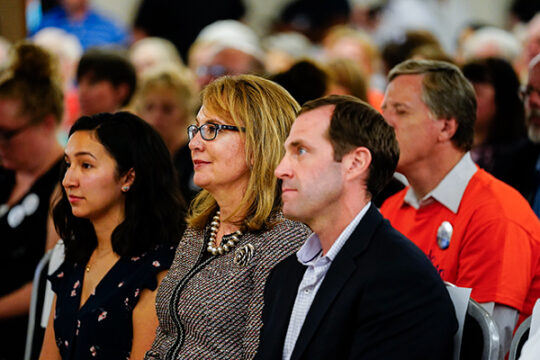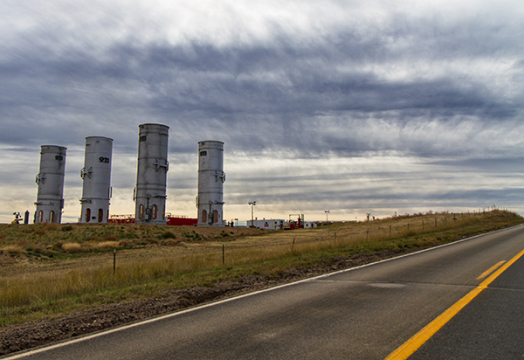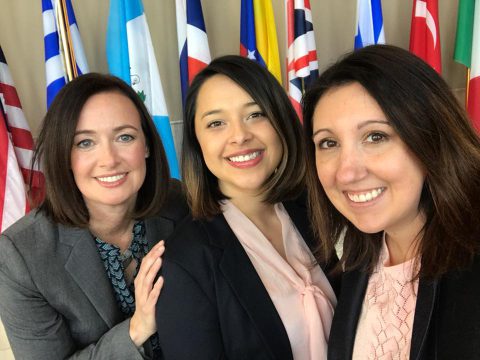Usually there is a stark difference between national and local politics.
But 2019 is not a usual year for Aurora, where seasoned politicos are asking for votes, high-profile endorsements are rolling in and polls ask how Aurora voters feel about gun control, abortion and the death penalty.
Issues aren’t the only national cloud hanging over Aurora’s 2019 election. Partisan politics are also inserting themselves into what has traditionally been at least a perceptibly non-partisan process.
There isn’t a “D” or an “R” next to their names. School board candidates, city council hopefuls, and those seeking seats on local water and metro district boards are presented to the voters without a political party.
These candidates, if elected, typically focus on day-to-day issues. But there’s a swelling political undercurrent for these races where national gridlocked issues — like gun violence, immigration and health care — are made to fit in right alongside the typical municipal matters, such as annexing land, funding public safety departments and paving roads.
“National issues are intruding in local politics, and I think there are a couple of reasons for this,” said Pavielle Haines, a postdoctoral fellow with the Center on American Politics at the University of Denver. “One thing that’s happened over time, and we know this because political scientists track this, people have become increasingly emotional about partisanship. If you were to ask somebody 30 or 50 years ago about marrying somebody from a different party, it wouldn’t be a big deal at all.”

Photo by Philip B. Poston/Sentinel Colorado
That’s changed.
“Political affiliation has become central to people’s identity. They carry that identity with them,” Haines said. “That’s the psychological piece, they are really internalizing the identity they’re getting from national politics.”
The other reason, she said, is that Congress has become increasingly gridlocked. With less getting done at the national level, there’s a perceived opportunity to make more happen at the state and local level.
“People are increasingly frustrated with how difficult it seems to be for the federal government to get anything done,” Haines said. “State and local politics have received a lot of renewed interests because there isn’t as much gridlock at this point… both parties are recognizing this and making an effort to recruit candidates at the state and local level.”
Aurora’s mayoral race features former Republican Congressman Mike Coffman, who represented Aurora for a decade. There’s also former U.S. Senate candidate Ryan Frazier, who recently shed his Republican affiliation. Also bidding for the mayor’s seat is Omar Montgomery, a self-described progressive college professor who is luring national political endorsements. Rounding out the ballot are veteran council members Marsha Berzins, a Republican, and Renie Peterson, who recently ran for an Adams County commissioner seat as an independent.
The candidates’ political experience is a representation of how federal politics have edged into local races and offices.
Earlier this month, a mysterious push-poll for the Aurora City Council started circulating, asking voters whether they would vote for a candidate that “focused on national political controversies like relaxing immigration laws and gun control, or a candidate focused on relevant local issues like jobs, traffic, and addressing the cost of living in Aurora.”
It’s not clear who put together the poll, which is hosted through a survey company that doesn’t reveal any details about the publisher.
The survey went on to ask participants to rank issues of importance like banning assault rifles, allowing abortions until the third trimister, repealing the death penalty and ensuring pre-existing conditions are covered by health insurance — all issues that are sparsely taken up by city councils.
This isn’t surprising for Colorado pollster David Flaherty of Magellan Strategies.
“It’s a sign of the times. We’ve done city council races and it’s been more about life experience and making the budget and seeing how every dollar is spent. Much more bland stuff,” he said. “In our hyper-partisan, charged political world it’s different now.”

Gone are the days of city council meetings where the only topic of discussion is funding for open spaces or traffic lights.
Two months ago, the city council chamber was packed to its limit with supporters of the oil and gas industry, when Aurora City Council member Dave Gruber took to the floor to condemn three city council women for attending a protest against federal immigration policies and privately owned and operated immigration detention centers, where protestors desecrated an American flag.
“I’ve already seen backpedaling since our council members have discovered how much they have hurt the citizens of Aurora,” Gruber said at the podium. “I can hear arguments saying even though I gave a speech under the desecrated flag, it was not my doing. To this, I remind you that the masked men that attacked our flag were invited participants. They did not simply show up. Our council members were complicit in these acts, and we the veterans hold you accountable.”
A young woman with a camera filmed Gruber’s speech. The video eventually made its way to a popular conservative Facebook page where it got 41,000 views.
“God bless Colonel Dave Gruber Aurora City Council At-Large for his military service and for standing up for America,” the video’s description says. “Shame on Aurora City Council cowards Allison Hiltz, Nicole Johnston, and Crystal Murillo for telling police to stand down while leftist whackjobs trespassed on Federal Government property, stomped on the U.S. Flag, and raised a Mexican one in its place. Truly disgusting.”
The three councilwomen had condemned the desecration before Gruber’s speech.
A new political era for Aurora
Political watchers agree, this is not the stuff of municipal politics as usual.
Hiltz, Johnston and Murillo are graduates from Emerge, a nationwide organization that trains women Democrats to run for office whether it’s a partisan race or not. Their affiliation with the group has been a target for criticism on the dais, in offhand conversations about city hall and in online comment sections.
Being an Emerge graduate has equated the trio, and other candidates across the state, with leftwing politics — nearly a party of its own — even though the training doesn’t endorse policies or tell candidates how to vote on any issues.
“We’re not very political at all, but under Trump, training women to do anything in the public sphere is inherently political,” said Emerge director Michal Rosenoer. “Emerge just trains women, but a lot of those personal values can be seen as partisan: young, LGBTQ, women of color. I might call it a values-oriented platform, but somebody who doesn’t like those platforms sees it as political.”

Emerge sees its goal as 51 percent of elected officials being women, because 51 percent of the population is women.
This year, two candidates in the 2019 Aurora City Council race were trained by Emerge, Leanne Wheeler in the at-large race and Alison Coombs in the Ward V race. Wheeler says since graduating from Emerge in 2017 she has become an unaffiliated voter.
If elected, those two alone would give “progressive” members of city council an edge over the current majority, which is seen as conservative.
Rosenoer said Emerge graduates who are elected to local offices are challenging the status quo, an indication that local office has always been political but not very partisan.
“In the end, Republicans have been recruiting and training local candidates for decades, and that’s one reason hyper-partisan politics have been a thing,” she said.
In terms of city politics, being associated with Emerge has become a big talking point. The mysterious poll thought the organization so important it asked participants what they thought of the training group.
“An organization called Emerge Colorado is actively recruiting and training candidates for city council races across the state,” the question said. “Emerge Colorado is part of a larger effort nationally to fund and win city councils’ and mayors’ offices in order to advance progressive causes at the local level, including issues like sanctuary cities, higher taxes on business and gun control.”
Participants were asked to choose that they either believed it was a good thing to have groups like Emerge involved in local elections or that “dark money” groups like Emerge were the last things local elections needed.
“As we create more momentum and win more strategic seats, that backlash is inevitable,” Rosenoer said. “Non-partisan races have partisan results. If the people in power are not reflecting the voters, then the voters are more likely to swing in the other direction.”
She pointed out that’s particularly true in Arapahoe County, which has seen an increase in unaffiliated voters in recent years.
Flaherty also sees the growing unaffiliated voter numbers as a key to understanding how local elections and seats are becoming more political. Instead of looking for political parties, they’re looking for problem solvers, he said. Moreover, they are voters that care about issues like public education and lowering the cost of healthcare, and they tend to lean more liberal.